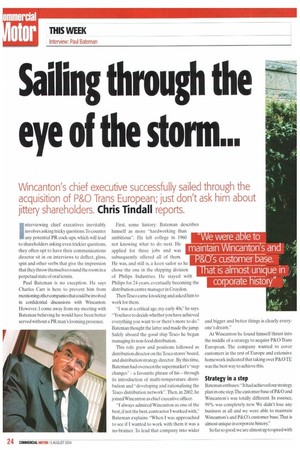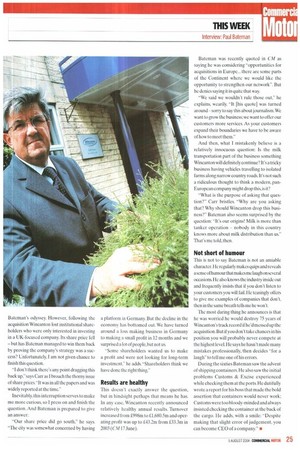Sailing through the eye of the storm...
Page 24

Page 25

If you've noticed an error in this article please click here to report it so we can fix it.
Wincantonis chief executive successfully sailed through the acquisition of P&O Trans European; just don't ask him about jittery shareholders. Chris Tindall reports.
Interviewing chief executives inevitably involves asking tricky questions.To counter any potential PR cock-ups. which will lead to shareholders asking even trickier questions, they often opt to have their communications director sit in on interviews to deflect, gloss, spin and other verbs that give the impression that they throw themselves round the room in a perpetual state of oral tennis.
Paul Bateman is no exception. He says Charles Carr is here to prevent him from mentioning other companies that could be involved in confidential discussions with Wincanton. However, I come away from my meeting with Bateman believing he would have been better served without a PR man's looming presence. First, some history: Bateman describes himself as more "hardworking than ambitious". He left college in 1960 not knowing what to do next. He applied for three jobs and was subsequently offered all of them. He was, and still is, a keen sailor so he chose the one in the shipping division of Philips Industries. He stayed with Philips for 24 years, eventually becoming the distribution centre manager in Croydon.
"I was at a critical age, my early 40s," he says. "You have to decide whether you have achieved everything you want to or there's more to do." Bateman thought the latter and made the jump. Safely aboard the good ship Tesco he began managing its non-food distribution.
This role grew and positions followed as distribution director on the Tesco stores' board, and distribution strategy director. By this time, Bateman had overseen the supermarket's "step changes" — a favourite phrase of his — through its introduction of multi-temperature distribution and "developing and rationalising the Tesco distribution network". Then, in 2002, he joined Wincanton as chief executive officer.
"I always admired Wincanton as one of the best, if not the best, contractor I worked with," Bateman explains. "When I was approached to see if I wanted to work with them it was a no-brainer. To lead that company into wider and bigger and better things is clearly everyone's dream."
At Wincanton he found himself thrust into the middle of a strategy to acquire P&O Trans European. The company wanted to cover customers in the rest of Europe and extensive homework indicated that taking over P&O TE was the best way to achieve this.
Strategy in a step
Bateman enthuses: "It had achieved our strategy plan in one step.The customer base of P&O and Wincanton's was totally different. In essence, 99% was completely new. We didn't lose any business at all and we were able to maintain Wiricanton's and P&O's customer base. That is almost unique in corporate history."
So far so good; we are almost up to speed with Bateman's odyssey. However, following the acquisition Wincanton lost institutional shareholders who were only interested in investing in a UK-focused company. Its share price fell — but has Bateman managed to win them back by proving the company's strategy was a success? Unfortunately. I am not given chance to finish this question.
"I don't think there's any point dragging this back up," says Carr as I broach the thorny issue of share prices. "It was in all the papers and was widely reported at the time."
Inevitably, this interruption serves to make me more curious, so I press on and finish the question. And Bateman is prepared to give an answer: "Our share price did go south," he says. "The city was somewhat concerned by having a platform in Germany. But the decline in the economy has bottomed out. We have turned around a loss making business in Germany to making a small profit in 12 months and we surprised a lot of people, but not us.
"Some shareholders wanted us to make a profit and were not looking for long-term investment." he adds. "Shareholders think we have done the right thing."
Results are healthy This doesn't exactly answer the question, but in hindsight perhaps that means he has. In any case, Wincanton recently announced relatively healthy annual results. Turnover increased from £998m to L1,580.5m and operating profit was up to £43.2m from £33.3m in 2003 (CM 17 June). Bateman was recently quoted in CM as saying he was considering "opportunities for acquisitions in Europe... there are some parts of the Continent where we would like the opportunity to strengthen our network". But he denies saying it in quite that way.
"We said we wouldn't rule those out," he explains, wearily. "It [his quote] was turned around—sorry to say this about journalism. We want to grow the business; we want to offer our customers more services. As your customers expand their boundaries we have to be aware of how to meet them."
And then, what I mistakenly believe is a relatively innocuous question: Is the milk transportation part of the business something Wincanton will definitely continue? It's a tricky business having vehicles travelling to isolated farms along narrow country roads. It's not such a ridiculous thought to think a modern, panEuropean company might drop this, is it?
"What is the purpose of asking that question?" Carr bristles. "Why are you asking that? Why should Wincanton drop this business?" Bateman also seems surprised by the question: "It's our origins! Milk is more than tanker operation — nobody in this country knows more about milk distribution than us." That's me told, then.
Not short of humour
This is not to say Bateman is not an amiable character. He regularly makes quips and reveals a sense of humourthat makes me laugh on several occasions. He also knows the industry inside out and frequently insists that if you don't listen to your customers you will fail. He teasingly offers to give me examples of companies that don't, then in the same breath tells me he won't.
The most daring thing he announces is that he was worried he would destroy 75 years of Wincanton's track record if he'd messed up the acquisition. But if you don't take chances in his position you will probably never compete at the highest level. He says he hasn't made many mistakes professionally, then decides "for a laugh" to tell me one of his errors.
During the sixties Bateman saw the advent of shipping containers. He also saw the initial problems Customs & Excise experienced while checking them at the ports. He dutifully wrote a report for his boss that made the bold assertion that containers would never work; Customs were too bloody-minded and always insisted checking the container at the back of the cargo. He adds, with a smile: "Despite making that slight error of judgement, you can become CEO of a company"


































































































































































































